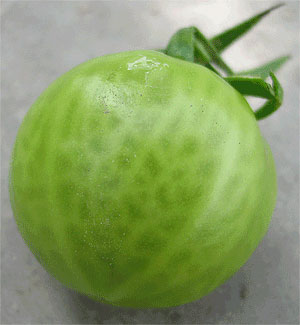Oxnard, California
June 22, 2006
A
recent outbreak of bacterial canker in British Columbia, Canada
left greenhouse growers looking for answers. While unable to
provide a cure, Seminis
responded to this outbreak by sending Dr. Kevin Conn, a senior
scientist from Seminis’ plant pathology lab in Woodland,
California to visit with growers and provide them with more
information about bacterial canker, its epidemiology and control
measures.
|
 |
|
Growers
witnessed a symptom not previously associated with
bacterial canker. Infected fruits showed a mottled,
netting discoloration. |
“Bacterial canker is the kiss of death to a seed lot,” Conn
said. “Our varieties were not suspect, but we wanted to offer
support, now and later on, to the growers. We’re concerned; we
want growers to be successful.”
Along with Seminis sales manager Joep van de Burgt, Conn visited
four greenhouses in the Delta area, some of which had recent
problems with the disease and others looking for more
information about prevention.
Conn visited with grower Gert Van Straalen at Millennium Pacific
Greenhouse Partnership. While they had not encountered problems
with bacterial canker in their greenhouses, they were pleased to
have more information about the disease.
“It was an extremely useful visit. Kevin’s brain is full of
information. He showed me some things about bacterial canker
that I had never seen before. He made us more aware of the
problem and was very helpful,” Straalen said.
A
real concern for growers, bacterial canker can survive for up to
three or more years in infected plant debris, caused by
Clavibacter michiganensis subsp. michiganensis. It
can also survive on weeds, volunteer tomato plants and seed.
This disease can be spread by splashing water and the use of
contaminated equipment and tools in pruning, clipping and
transplanting operations. Moderate temperatures and greater than
80 percent relative humidity favor disease development.
 |
|
Dr.
Kevin Conn discusses bacterial canker with growers in
British Columbia, Canada. |
Conn recommends many control measures including, but not limited
to, the following:
-
Only use seed from certified seed lots that
have been assayed for the presence of bacterial canker.
-
Wash hands and arms thoroughly with soap and
water before working with plants.
-
Workers should wear freshly laundered
clothing each day.
-
Remove all plant debris.
-
Check plants frequently. Suspect and infected
plants should be removed and burned.
“There’s no silver bullet, no real answer in this outbreak. The
growers here run such clean operations that it’s hard to imagine
where the bacterium are hiding,” Conn said. “I’m very impressed;
these are the most sophisticated growers I’ve met.”
For more information about bacterial canker or to request a copy
of Seminis’ Tomato Disease Guide please contact your local
Seminis representative.
Seminis is the world’s leading developer,
producer and marketer of vegetable seeds. Its products are
designed to reduce the need for agricultural chemicals, increase
crop yield, reduce spoilage, offer longer shelf life, and create
better tasting foods and foods with higher nutritional content.
Seminis has established a worldwide presence and global
distribution network that spans 150 countries and territories.
|